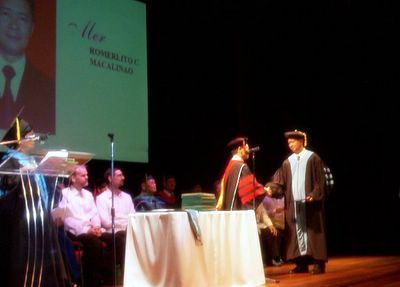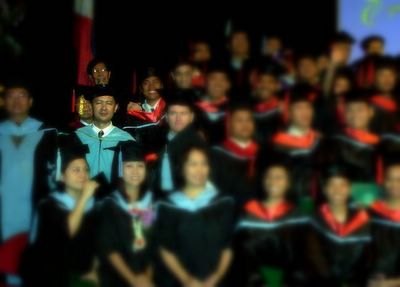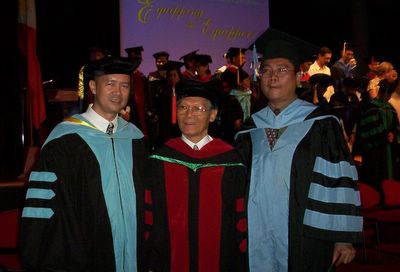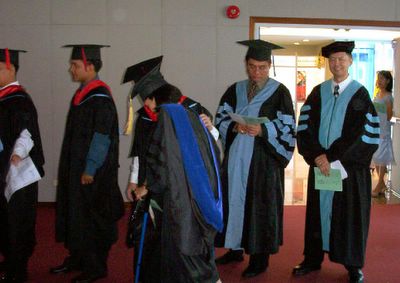Ten years ago Gordon Robertson, son of 700 Club founder and president Pat Robertson, heard his personal voices from the wilderness, first in India and then the Philippines. He was a practicing lawyer, but he quit from his lucrative career and responded to the call of God. In India he saw the need for the salvation. When he came to the Philippines he saw a vision of boatloads of Filipinos sailing to different parts of the world. This vision led to the formation of the Asian Center for Missions. Since then, ACM has commissioned Filipino missionaries to different parts of the world, some even in restricted places.
I am personally amazed by the stories of Filipino missionaries that came for the occassion. Stories from the Killing Fields of Cambodia, Kazakhstan, and even in the Sub-Saharan Africa, were all awe-inspiring and challenging. As a result, numbers of people responded with the call to missions. Imagine to be the first missionary to share the message of the salvation to one of the biggest nomadic tribe in Africa - the Fulani tribe? I was really moved by the presentation of our kababayan missionary. I can only wish you were there at the conference. You'd feel proud that the Lord is using Filipinos to reach the unreached. The identities of the missionaries are classified since most of them are working in restricted areas.
GlobalFil Alliance Inc. is working towards a partnership with ACM and other similar organizations. We believe, as Gordon Robertson does, that Filipinos are strategically located in different parts of the world. This is not without reason. Where Filipinos are, the message of Jesus Christ can be heralded. How this is to be accomplished? It will have to be creative, innovative, and non-directive. By providing educational services that showcase cultural revitalization, international cooperation, and national transformation, we can win the nations through the Filipino nation. Join us.
To our beloved Filipino missionaries all over the world, let us pray that the presence and power of God will guide, protect, and provide as they fulfill God's purpose to the nations.
A Seminar-Workshop on Teaching Strategies, Learning Styles, & Multiple Intelligences
A Church of God congregation, located within the margins of the former Clark Air Base, invited Dr. Romerlito C. Macalinao to conduct a seminar-workshop on Teaching Strategies, Learning Styles, and Multiple Intelligences among its teachers. Being well attended, participants ranged from very young to adult teachers. Understanding Filipino space, the event was moved from the sanctuary to a regular classroom for kindergarten kids. This allowed for closer communication, meaningful interaction, and better absorption of the teaching. The room was packed with about 50 people. Praise the Lord for such wonderful feedback.
Volunteer workers, teachers, assistants, and parents attended the whole day seminar-workshop

Volunteer workers, teachers, assistants, and parents attended the whole day seminar-workshop


The Appreciative Church
Prof. Romerlito C. Macalinao, M.A., Ed.D.
A church of more than a decade has been experiencing a decline in congregational size. The leadership of the church finds no difficulty to pin the problem to the pastor. The pastor of the church feels the pinch. He has led this church for all those years. He knows the vibrancy of the early years of the church and the contrasting lethargy of these later years. He longs to bring back those glory years, but how? It was easy for the leadership of the church to want a new pastor. For the membership, they simply left the church. Tension fills the church. If you were the pastor, church leader, or member of this church what would you do?
A Filipino church in Seattle is using the facilities of a EuroAmerican church. The Filipino church is steadily growing as opposed to a shrinking size of the EuroAmerican church. The pastor of the Filipino church is nearly half the age of the pastor of the EuroAmerican church. This age-difference seems to extend among the congregants of both churches. You have a vibrant Filipino congregation with young Filipino pastor with a membership of predominantly young families and a lethargic EuroAmerican congregation with an old EuroAmerican pastor with a membership of predominantly old congregants. Both churches belong to the same denomination. They knew they could do ministry together. What would you do in this situation?
A large denomination desires to recapture a corporate vision. It seeks to encourage common ministries among its multi-ethnic churches all over the US while advancing the Great Commission. A global humanitarian organization is aiming at a fresh articulation of its vision and mission in the 21st century. Beginning in 1950, this organization has continued to touch the lives many children all over the world. A nationwide retail chain of sporting goods in the country is attempting to improve the customer care of their sales people. A global institution that is responsible for maintaining global peace and progress is calling its member countries to a renewed compact for global change. What would these organizations do?
These organizations know the challenges of the present. They know that the preferred image of the future is to be accomplished if the right thing is done in the present. However, trapped in-between present realities and future aspirations is a creative tension. One way of handling creative tension is the problem-solving approach. On the contrary, these organizations addressed creative tension using the process of Appreciative Inquiry. So, what is Appreciative Inquiry? How is this done? What can this do to my church?
David Cooperrider - son of a Lutheran pastor and an active layman with the United Church of Christ in the USA - Suresh Srivastra and other colleagues at Case Western Reserve University pioneered in 1987 the organizational development tool called Appreciative Inquiry. The chart below shows the radical difference between Appreciative Inquiry and the traditional problem-solving approach (You may check this site for additional information. http://appreciativeinquiry.cwru.edu).
PROBLEM SOLVING (PS)
APPRECIATIVE INQUIRY (AI)
PS: What to fix? What is the problem? Participated by a few
AI: What to grow? What are the life-giving forces? Participated by many
PS: Underlying grammar of problems, symptoms, causes, solutions, action plan, intervention, weakness, deductive
AI: New grammar of best experiences, true, good, better, possible, real stories to learn from, strength, inductive
PS: Analyzes things into pieces and specialties, guaranteeing fragmented responses
AI: Narrates best experiences and gathers common elements reflective of the ideal
PS: Slow. Takes a lot of effort to generate positive emotion for change from a negative process
AI: Fast! Rides on the inspiration generated by exemplary experiences for more positive change in the future
PS: Assumes organizations are constellations of problems to be overcome
AI: Assumes organizations are sources of infinite capacity and imagination
The problem-solving approach is widely practiced, even in churches. It seems easier to identify the problems of churches. It seems equally easy to propose some solutions to these problems. It seems that not many believers, pastors, leaders, and workers successfully get away from this problem-solving approach. What can be done to rectify this situation when it seems that this is just the way it is. Change? To shift from the familiar problem-solving approach to an appreciative inquiry process is like moving a mountain. It is difficult at first, but it is doable. While churches respond from a problem-solving approach, there must now be intentional efforts towards the affirmative process. So churches proceed with any or all of these three kinds of changes. There will be a program change, a policy change, and or a people change. Instantaneously churches are once again trapped into the problem-solving approach. A review will be conducted to look into possible problems on programs, policies, and people. With a starting point to look for problems, churches successfully find problems. You can easily predict what follows after this. So churches adapt new programs, revise existing policies, or even get a new pastor. But most often than not, after a while, problems ugly head begin to show up once more. Churches get really confounded at this point. This picture is for real.
I believe these three kinds of changes; however, add to these an overarching Appreciative Inquiry process of change. So what needs to be affirmed in churches? Is it not that every true believer holds in his/her consciousness an image of the New Testament Church? Is it not that such images are translated into contemporary experiences of the best in church life? Then what are these best experiences in church life? From this positive, affirmative, and appreciative starting point, the whole community begins to share their best experiences. This is Discovery, the first phase of the Appreciative Inquiry process. Stories of best experiences in church will be heard. Everyone reaches a collective consciousness of best experiences in church. Morale is high. Once this common ground is established, the next step is to reach higher ground. This is Dream, the second phase of the Appreciative Inquiry process. Strike while the iron is hot. Best experiences lead to best practices. Believers begin to collaborate from this positive core. What they focus on becomes their reality. Changes can now be addressed from the succeeding phase of the Appreciative Inquiry. This covers the last two phases, the Design and Destiny phase of the Appreciative Inquiry process. While the 4-D process of Appreciative Inquiry look simple, facilitating an Appreciative Inquiry summit may last for a day to as long as several days depending on the nature of the inquiry. One thing I know, I have never seen any true believer, who heartily participated in an Appreciative Inquiry process, come out disillusioned and depressed of church.
The potential application of Appreciative Inquiry is limitless. It has also been described as innovation in the speed of imagination. It has been used in developing mission and vision statement, strategic planning, interfaith initiatives, process and service enhancements, organizational and system redesign, civic and community development, and group culture change, to name a few. The process of Appreciative Inquiry begins with an affirmative topic choice. By asking the right questions, everyone desiring positive change stands on the doorstep of a compelling future.
A Chinese proverb says that with great questions come great answers. True believers, pastors, workers, and leaders need to ask the right questions. What is the problem? What are the issues? What needs to be solved? What are the concerns? These are questions that come from a deficit mentality. Scriptures abound on cultivating the appreciative. What happened to setting your mind on things that are at the right hand of the Father? What happened to transforming our minds instead of conforming to the problem-solving approach of the world? While it is true that Christians are sinners (negative) saved by grace; Christians are saved called to be saints (positive). Which of the two preferably builds up? While it is also true that problems in church cannot be eliminated, only minimized, said a dear friend of mine many years back, you can choose not to dwell on problems. Christians need to practice asking appreciative questions. Asks for the things that affirm, edify, and inspire. When we do, we will not be asking why churches are not growing? Why members lack commitment? Why the funds are low? Why there is a lack of vision? Instead we will be asking, when was the time when churches were growing, members were committed, funds abound, and a sense of vision? Just imagine the stories that would emerge from this question. Excitement is generated by the question. Enthusiasm is to be seen in the faces of congregants. Common understanding gives birth to team spirit. Commitment to action is cemented. Everyone moves on the same direction. The glory days of the past, from individual to corporate consciousness, is brought to the present and propelled at a higher level into the future.
Despite all the personal hardships the apostle Paul experienced in the work of the Lord, he has been encouraging Christians to be thinking only of things that are true, noble, right, pure, lovely, of good report, excellent, and praiseworthy. Being appreciative is one of the many things that kept the apostle going. We need the same in our churches today. Imagine an appreciative church. Dynamite!
Dr. Romerlito C. Macalinao is Founder and CEO of GlobalFil Alliance Inc., an educational consultancy service with a vision of “A global network of Filipinos committed to international partnership, cultural revitalization, and national transformation.” Web addresses: http://www.geocities.com/drmacalinao and http://www.drmacalinao.blogspot.com/ GlobalFil Alliance Inc. provides AI-based seminar-workshops, curriculum development, training and design, leadership development, and short-term assessments to long-term transformation processes. Dr. Macalinao is an adjunct faculty at the Asian Seminary of Christian Ministries, JIL International Bible College and a workplace minister in the 9 to 5 window.
A church of more than a decade has been experiencing a decline in congregational size. The leadership of the church finds no difficulty to pin the problem to the pastor. The pastor of the church feels the pinch. He has led this church for all those years. He knows the vibrancy of the early years of the church and the contrasting lethargy of these later years. He longs to bring back those glory years, but how? It was easy for the leadership of the church to want a new pastor. For the membership, they simply left the church. Tension fills the church. If you were the pastor, church leader, or member of this church what would you do?
A Filipino church in Seattle is using the facilities of a EuroAmerican church. The Filipino church is steadily growing as opposed to a shrinking size of the EuroAmerican church. The pastor of the Filipino church is nearly half the age of the pastor of the EuroAmerican church. This age-difference seems to extend among the congregants of both churches. You have a vibrant Filipino congregation with young Filipino pastor with a membership of predominantly young families and a lethargic EuroAmerican congregation with an old EuroAmerican pastor with a membership of predominantly old congregants. Both churches belong to the same denomination. They knew they could do ministry together. What would you do in this situation?
A large denomination desires to recapture a corporate vision. It seeks to encourage common ministries among its multi-ethnic churches all over the US while advancing the Great Commission. A global humanitarian organization is aiming at a fresh articulation of its vision and mission in the 21st century. Beginning in 1950, this organization has continued to touch the lives many children all over the world. A nationwide retail chain of sporting goods in the country is attempting to improve the customer care of their sales people. A global institution that is responsible for maintaining global peace and progress is calling its member countries to a renewed compact for global change. What would these organizations do?
These organizations know the challenges of the present. They know that the preferred image of the future is to be accomplished if the right thing is done in the present. However, trapped in-between present realities and future aspirations is a creative tension. One way of handling creative tension is the problem-solving approach. On the contrary, these organizations addressed creative tension using the process of Appreciative Inquiry. So, what is Appreciative Inquiry? How is this done? What can this do to my church?
David Cooperrider - son of a Lutheran pastor and an active layman with the United Church of Christ in the USA - Suresh Srivastra and other colleagues at Case Western Reserve University pioneered in 1987 the organizational development tool called Appreciative Inquiry. The chart below shows the radical difference between Appreciative Inquiry and the traditional problem-solving approach (You may check this site for additional information. http://appreciativeinquiry.cwru.edu).
PROBLEM SOLVING (PS)
APPRECIATIVE INQUIRY (AI)
PS: What to fix? What is the problem? Participated by a few
AI: What to grow? What are the life-giving forces? Participated by many
PS: Underlying grammar of problems, symptoms, causes, solutions, action plan, intervention, weakness, deductive
AI: New grammar of best experiences, true, good, better, possible, real stories to learn from, strength, inductive
PS: Analyzes things into pieces and specialties, guaranteeing fragmented responses
AI: Narrates best experiences and gathers common elements reflective of the ideal
PS: Slow. Takes a lot of effort to generate positive emotion for change from a negative process
AI: Fast! Rides on the inspiration generated by exemplary experiences for more positive change in the future
PS: Assumes organizations are constellations of problems to be overcome
AI: Assumes organizations are sources of infinite capacity and imagination
The problem-solving approach is widely practiced, even in churches. It seems easier to identify the problems of churches. It seems equally easy to propose some solutions to these problems. It seems that not many believers, pastors, leaders, and workers successfully get away from this problem-solving approach. What can be done to rectify this situation when it seems that this is just the way it is. Change? To shift from the familiar problem-solving approach to an appreciative inquiry process is like moving a mountain. It is difficult at first, but it is doable. While churches respond from a problem-solving approach, there must now be intentional efforts towards the affirmative process. So churches proceed with any or all of these three kinds of changes. There will be a program change, a policy change, and or a people change. Instantaneously churches are once again trapped into the problem-solving approach. A review will be conducted to look into possible problems on programs, policies, and people. With a starting point to look for problems, churches successfully find problems. You can easily predict what follows after this. So churches adapt new programs, revise existing policies, or even get a new pastor. But most often than not, after a while, problems ugly head begin to show up once more. Churches get really confounded at this point. This picture is for real.
I believe these three kinds of changes; however, add to these an overarching Appreciative Inquiry process of change. So what needs to be affirmed in churches? Is it not that every true believer holds in his/her consciousness an image of the New Testament Church? Is it not that such images are translated into contemporary experiences of the best in church life? Then what are these best experiences in church life? From this positive, affirmative, and appreciative starting point, the whole community begins to share their best experiences. This is Discovery, the first phase of the Appreciative Inquiry process. Stories of best experiences in church will be heard. Everyone reaches a collective consciousness of best experiences in church. Morale is high. Once this common ground is established, the next step is to reach higher ground. This is Dream, the second phase of the Appreciative Inquiry process. Strike while the iron is hot. Best experiences lead to best practices. Believers begin to collaborate from this positive core. What they focus on becomes their reality. Changes can now be addressed from the succeeding phase of the Appreciative Inquiry. This covers the last two phases, the Design and Destiny phase of the Appreciative Inquiry process. While the 4-D process of Appreciative Inquiry look simple, facilitating an Appreciative Inquiry summit may last for a day to as long as several days depending on the nature of the inquiry. One thing I know, I have never seen any true believer, who heartily participated in an Appreciative Inquiry process, come out disillusioned and depressed of church.
The potential application of Appreciative Inquiry is limitless. It has also been described as innovation in the speed of imagination. It has been used in developing mission and vision statement, strategic planning, interfaith initiatives, process and service enhancements, organizational and system redesign, civic and community development, and group culture change, to name a few. The process of Appreciative Inquiry begins with an affirmative topic choice. By asking the right questions, everyone desiring positive change stands on the doorstep of a compelling future.
A Chinese proverb says that with great questions come great answers. True believers, pastors, workers, and leaders need to ask the right questions. What is the problem? What are the issues? What needs to be solved? What are the concerns? These are questions that come from a deficit mentality. Scriptures abound on cultivating the appreciative. What happened to setting your mind on things that are at the right hand of the Father? What happened to transforming our minds instead of conforming to the problem-solving approach of the world? While it is true that Christians are sinners (negative) saved by grace; Christians are saved called to be saints (positive). Which of the two preferably builds up? While it is also true that problems in church cannot be eliminated, only minimized, said a dear friend of mine many years back, you can choose not to dwell on problems. Christians need to practice asking appreciative questions. Asks for the things that affirm, edify, and inspire. When we do, we will not be asking why churches are not growing? Why members lack commitment? Why the funds are low? Why there is a lack of vision? Instead we will be asking, when was the time when churches were growing, members were committed, funds abound, and a sense of vision? Just imagine the stories that would emerge from this question. Excitement is generated by the question. Enthusiasm is to be seen in the faces of congregants. Common understanding gives birth to team spirit. Commitment to action is cemented. Everyone moves on the same direction. The glory days of the past, from individual to corporate consciousness, is brought to the present and propelled at a higher level into the future.
Despite all the personal hardships the apostle Paul experienced in the work of the Lord, he has been encouraging Christians to be thinking only of things that are true, noble, right, pure, lovely, of good report, excellent, and praiseworthy. Being appreciative is one of the many things that kept the apostle going. We need the same in our churches today. Imagine an appreciative church. Dynamite!
Dr. Romerlito C. Macalinao is Founder and CEO of GlobalFil Alliance Inc., an educational consultancy service with a vision of “A global network of Filipinos committed to international partnership, cultural revitalization, and national transformation.” Web addresses: http://www.geocities.com/drmacalinao and http://www.drmacalinao.blogspot.com/ GlobalFil Alliance Inc. provides AI-based seminar-workshops, curriculum development, training and design, leadership development, and short-term assessments to long-term transformation processes. Dr. Macalinao is an adjunct faculty at the Asian Seminary of Christian Ministries, JIL International Bible College and a workplace minister in the 9 to 5 window.
Ed.D. Graduation '05 Photos
The graduation for my Doctorate in Education, with a cognate in Adult Education, has finally come. The graduation was held at the beautiful and modern facilities of Victory Christian Fellowship located at the affluent The Fort last April 8, 2005, Friday 5 pm. With me was my supportive wife - Kaye. Our three lovely kids, who would not be in the best of elements to attend a purely adult function, were better left at home. However, Ashiel, Keryx, & KrisMea got from us their icecream as we arrive home.
Dr. Rodrigo Tano, the Dean of the Asia Graduate School of Theology congratulates Dr. Romer C. Macalinao upon receiving diploma. The two expats in white barong tagalog are members of the board and their right side is Dr. Isabelo Magalit, the outgoing president of Asian Theological Seminar. Dr. Lydia Mapile, the associate program director and standing on the extreme left, assists Dr. Tano. 



Subscribe to:
Posts (Atom)













